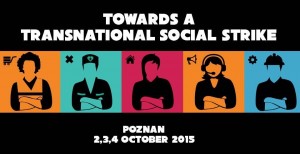 → Italian
→ Italian
Austerity is now the new normality in Europe. In these years monetary policies have been used to enforce neo-liberal labour reforms, privatization of the commons, cuts in welfare benefits and less civil rights. European governments and financial institutions use debt and technical parameters as a political tool to play workers and populations against each other, as the blackmail against Greece has shown. A new government of mobility is creating hierarchies among, between and inside European regions and is trying to limit the movements of migrants from inside and outside the EU. The global chains of production and of care-work criss-cross the European space using the different wage regimes and labour legislations for the sake of profits, creating a deep gap between the few rich and many poor. Through outsourcing and subcontracting the strength and the power of strike action is challenged.
The many existing struggles throughout Europe on wages, housing, welfare and freedom of movement are confronting, from different sides, the current attack on life and working conditions. Faced with the transnational dimension of these attack, it becomes apparent the need to overcome their isolation and to find common priorities. The new forms of mutualism and local self-organization which have developed since the crisis are confronted with the problem of enlargement and inability to communicate with other struggles on wage and working/living conditions. The capitalist divisions between permanent workers, temps and unemployed, migrants and locals, formal and informal sectors create obstacles to the organization of successful struggles inside and outside the workplaces, throughout all of society. While Trade Unions, associations and movements center their activity within a national context, the transnational dimension of the European government of mobility and labor requires the capacity to build a power on the same scale of the attacks deployed.
In front of this situation, we want to build up a process for a transnational social strike that could create connections, organization, transnational communication and strengthen common bonds between social and labor struggles. The transnational social strike starts from the limits of traditional forms of social and labor struggles and the form of trade union organization, from the loss of power that the strike, even when general, has experienced due to precarization and the transnational dimension of production. The strike is the name of a practice and of a process of organization, that entails the need to bring labor (in all its current forms) back in the agenda of the social movements. At the same time, the question is how to make the transnational social strike a process of organization able to widen the scale of existing insubordination and produce new and more powerful struggles, inside and outside the workplaces.
After the assembly held in Frankfurt on March 19th 2015, we want to take a step forward and meet in Poznan, Poland on the 2nd-4th October 2015. The meeting place in Poznan offers the opportunity to foster the participation from the Eastern countries of Europe that are at the center of the present regime of exploitation and to promote a deeper exchange among labor and social struggles across established borders and regions. In three days of panels, assemblies and workshops we want to keep focus on the singular situations, sharing experiences and tactics, and on how to build a political perspective able to become a reference point for the existing struggles as well as new ones to come. Some focuses for our discussions are: how do we organize resistances and claims in front of the transnational organization of production? How do we share common knowledge of the different conditions? How do we strike where the borders between the inside and the outside of the workplaces are blurring? Are the claims on European minimum wage, income, welfare and minimum residency permit for migrants able to work as tools of transnational organization and of connection between the already existing struggles in different cities and countries of Europe and beyond? How do we organize collectively against the fragmentation and individualization of labor? How to create connections between permanent and temporary workers? How to tackle the social conditions of exploitation?
Everyone who is interested in building this process and in contributing to its organization is very welcome to participate in the meeting.
Outline of the program:
Friday 2nd (late afternoon):
Introduction to the meeting
Round table: challenges and possibilities of a transnational social strike
Saturday 3rd:
Plenary and introduction to the workshops
Two sessions of workshop (3 hours each)
Sunday 4th (finish @lunch time):
Reports of the workshops and general assembly
Workshops:
We welcome everyone to propose and organize a workshop. We propose that each workshop has at least three groups who would co-present/organise. Each workshop should be introduced with a small summary text.If you want to organize a workshop please send us an email to info.transnationalstrike@autistici.org .
The deadline for the preparation of workshops is the 7th September 2015.
Following the contents of the call, the proposed workshops should consider a few general issues as core concerns. The workshops should discuss how the transnational chains of production and the supply chains – and their intertwining with financial operations – have transformed production and how to rethink labour struggles and strikes, asking what it means today to organize inside and outside the workplaces. We therefore consider fundamental how we address the role of migrant labour and mobility, the issues of precarity and unemployment, and the transformations of the welfare system as part and parcel of the transnational organization of labour. Finally, we think that one important task of the meeting is to discuss and elaborate potential common claims. We understand such claims as more than simple demands, namely as tools to organize and foster transnational communication where exploitation and command produce divisions and hierarchies.
If you are interested in attending the meeting and to help us plan our logistics for accommodation and meals and other requirements, please send an email to info.transnationalstrike@autistici.org before the 20th September 2015 .
The event will be English, but we will try to provide translations into other languages, please let us know in advanced which languages or if you would like to volunteer to help translate during the event.
 ∫connessioniprecarie connettere gli ∫connessi, produrre comunicazione
∫connessioniprecarie connettere gli ∫connessi, produrre comunicazione




